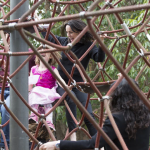If it takes an entire community taking an active role in contributing towards the raising of a child, then are we still not acknowledging the male elephant in the room? The advocacy of men in early childhood education (ECE) and the societal perception of male educators in general are troubling for the entire sector, and the survival of the male educator is hinged on the necessity for this to change. So how do we support being male, being connected and belonging in the early years? On 18 February 2017, a movement was started that could change the face of the early childhood profession forever. In an unassuming hotel meeting room near the border between New South Wales and the Australian Capital Territory (ACT), the first MENu Conference was held with 41 people in attendance. A small number in many ways, but when it comes to males in ECE, small numbers have added weight.
Representatives from across the nation and across genders attended to validate this revolution with a shared endeavour: to discuss how we could actively promote greater diversity in the profession by supporting males working with children. The conference discussion generated a range of calls-to-action, with Down to Earth Practical Solutions in partnership with Catharine Hydon Consulting leading the charge. Framing the MENu Conference, facilitators and guests not only shared but owned their personal stories. What made this moment resonate was the commitment and clear intention of a wide range of individuals, organisations and bodies from across Australia to change the way we all view male educators and their role in the need for gender diversity within and beyond education settings.
In preparation for the MENu Conference 2017, Down to Earth Practical Solutions conducted an audit of websites in the ACT to investigate the images used to promote gender diversity with regard to recruitment. It is important to note that the context of these images were representative of dominate genders and it is not suggested that all individuals identify with these gender identities. Down to Earth Practical Solutions would like to encourage all service types to review the content of their websites to reflect on how difference and diversity may or may not be represented through these images. Organisations needing support with self-assessment and reflective practice are encouraged to contact Down to Earth Practical Solutions. This simple change in the way that services and organisations present themselves as accepting of diversity can help to change the societal perception that the education and care of young children is not a space for men.
The discrimination and bias includes males not only being excluded or victim to an abuse of duty, but that males are additionally being labelled a high risk of being a ‘predator’. This perception of the male educator as a risk to children in education settings is further reinforced by articles such as Why I won’t let any male babysit my children. The author of this article also shares further pearls of gender stereotyped wisdom in the description of the book being promoted on the backend of the article: ‘Men have to do something really bad to be crippled by guilt. All women have to do is eat a piece of cake, raise their voice or allow their kids to play with an iPad’. While male educators do not babysit, these types of stories (and the gender stereotypes that they perpetuate) do seriously impact on the lives of those men who work in ECE, as well as the broader societal view on male educators. These themes are regularly unpacked across existing social media groups such as MANscaping the Male Educator and The MENtor Program for Males in ECE, which highlight the continued treatment of the ‘token male’ which would not be tolerated by our female counterparts is an unfair burden on the men of ECE.
Now the MENu platform has been officially launched, representatives have been empowered to no longer simply be the difference but to work hard to make a difference. To turn your advocacy into activism you can act at an individual, local and national level. Here are some actions you can start today:
- Let males in education and care settings know that they do not stand alone by using inclusive language in verbal and written communication.
- Contact your local Early Childhood Australia (ECA) branch to call for resources to support ECA’s Statement of Inclusion to support males working with children.
- Ensure that recruitment advertisements use inclusive language such as ‘men are welcome to apply’.
- Reflect, as a team, on the ‘unspoken duty statement’ differences between male and female educators.
- As a sector, provide feedback to Registered Training Organisations (RTOs) on how they can support male student educators.
- RTOs can provide information to services about the benefits of having male student educators and supporting them from the word go.
- Provide your photograph and statement to Down to Earth Practical Solutions, Catharine Hydon Consulting and the HESTA initiative (www.dteps.com.au) to make males working with children more visible in marketing and professional learning materials.
- Contact or respond to ministers—share your stories, what you do and who you are.
As keynote speaker for MENu 2017, Martyn Mills-Bayne from the School of Education at the University of South Australia, and the coordinator of the MENtor Program for Males in ECE challenged those present to be part of a movement. ‘This movement needs to be bigger than any one state, but must have strong networks emanating from within each state to be sustained and to best support local initiatives that build at the national and international level’, Mills-Bayne urged. A mere 2–4 per cent of the Australian ECE workforce is made up of men. Yet despite the continued efforts of many committed people in Australia and across the globe, there has been very little shift in the number of men that are entering our profession and choosing the education and care of our youngest humans as a long-term career.
With our focus on being, belonging and becoming for children, we need to be extending those same principles to our ideas about our colleagues working in early childhood settings to further support a gender diverse workforce and provide a rich relational experience for children. A wave of action was implemented across the nation in the wake of MENu 2017, and this relatively small meeting of minds has sparked a flame for the bigger movement required in our sector to see an increase in male educators. Down to Earth Practical Solutions and Catharine Hydon Consulting have made an intentional and joint decision to continue to promote males in ECE and have already begun utilising more diverse images in PowerPoint presentations and in anecdotal stories during professional development opportunities. Positive meetings have occurred with various ECA branches and representatives across Australia around an action plan that aims to effect national change, along with notable politicians being made aware of the movement started at MENu 2017. Watch this space and become an ally for a more gender diverse ECE workforce as the fight against gender disparity continues.
References
Edwards, K. (2017). Why I won’t let any male babysit my children. Sydney Morning Herald, 24 February 2017. Retrieved from www.smh.com.au/lifestyle/news-and-views/opinion/why-i-wont-let-any-male-babysit-my-children-20170223-gujn4f.html.
Department of Education and Training. (2013). National Workforce Census: Early childhood and child care, 23 May. Retrieved 10 April, 2017, from https://docs.education.gov.au/node/35839.












Sorry, while I can certainly acknowledge that society might generalise and assume men in the profession must be predators, I believe the issue is more to do with the low pay scale. What family can survive on under $40,000 pa. The majority of families at sometime may rely on the dad’s income and no one can survive for long on that income. I have stayed in FDC because taking a job in a centre wouldn’t pay the bills and I’m a single woman with a grown up family. At least running my own business I can determine my income.
Molly,
I support the early childhood workforce reflecting the make-up of the wider community, but I do not see this as happening until the Australian community thinks differently around gender and child-rearing as a whole.
So my question always is, what do you expect men (or people of diverse genders) to bring to the role of early childhood educator that women themselves are not already bringing?
well said Molly… we all need to be aware of the bias that we perpetuate… thanks for holding us to account!
Really great article, Molly, Martin and Ben. I believe these stories need to be told and not wished away – the bias is real, and pretending it isn’t and blaming it on the media does nothing to change perceptions.
Appreciate your thoughts Yarrow.
As you would be aware, society is a slow and ungainly beast and sometimes needs coaxing along. It often lags behind the edge of human care and ethical treatment of all its citizens. I expect men to bring the same thing women bring to EC roles: high quality pedagogy and care for all children. What men can bring however, is a perspective that may be missing from many early education spaces…whether that is masculine,feminine or the unique combination that each of us that actually occurs in real life… a perspective that may or may not differ from our female colleagues, but one that comes from a male educator. But what I now see as perhaps the more important thing that a male ECE brings to the role is the interactions between us and our female (and male) colleagues… the rich and positive interactions between adults across the spectrum of gender that provide a scaffold for children’s growing sense of what positive human relationships can be.
Would one of the authors mind clarifying the term “unspoken duty statement” in regards to the context in this article. I’m unsure as to what this phrase means (tried googling and this article was the only result haha)
Great article, gives me a starting point to become more involved in stepping up my advocacy and working towards activism.
Hi Andrew, good to hear this article has sparked your advocacy into activism! The ideas around the ‘unspoken duty statements’ came out of some of the dialogue at the MENu 2017 conference where many men felt there was often a set of tasks that only they were asked to do such as: constructing flat pack furniture, fixing of items, capturing of invading birds and bugs, as well as supervising some of the more risky/rough & tumble/gross motor play experiences. It was felt that some of these implicit expectations work to reinforce gender stereotypes and place some male educators in awkward spaces if refused. Hope this clarifies…thanks for your comments.
Hi Chris, low pay is an issue across the sector and is not limited to a specific set of identity markers such as gender. As you know there are many households with only one parent so their income is mostly what the family have to live off. You might also be aware that it is becoming increasingly common for the main income of the home to not come from a male. So yes the pay is an issue, but does not detract from the need to have a more diverse workforce. Many believe encouraging more men into the profession could lead to the pay increasing. For me the best way to have better pay conditions is for the profession as a whole to be more highly regarded in society and by the decision makers of this world. If that would then result in more men working with young children then that would be great, but they are separate issues with very unique agendas. For me getting more gender diversity and other forms of diversity into the early years sector is important for one main reason, so that children have opportunities to engage with those diverse individuals without prejudice, bias or misunderstanding.